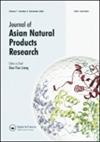Rosmarinic acid suppresses the progression of COPD via Syk by modulating airway inflammation and epithelial apoptosis in vivo and in vitro
IF 1.3
3区 医学
Q3 CHEMISTRY, APPLIED
引用次数: 0
Abstract
Rosmarinic acid (RosA), a hydrophilic phenolic compound found in various plants, has several biological effects such as anti-inflammatory and anti-apoptosis activities. However, its potential impact on chronic obstructive pulmonary disease (COPD) and its underlying mechanism has not been investigated. In this study, we explored the potential therapeutic effects and mechanism of RosA on COPD airway inflammation and alveolar epithelial apoptosis in vivo and in vitro. Our data suggested that RosA may be a therapeutic candidate for COPD with low toxicity. The corresponding mechanism lies in its anti-inflammatory effect on macrophage and bronchial epithelial cells, as well as protective effect on lung epithelial apoptosis via the jointly cross-target spleen tyrosine kinase (Syk).
迷迭香酸在体内和体外通过调节气道炎症和上皮细胞凋亡,通过 Syk 抑制慢性阻塞性肺病的发展。
迷迭香酸(RosA)是一种存在于多种植物中的亲水性酚类化合物,具有多种生物效应,如抗炎和抗细胞凋亡活性。然而,它对慢性阻塞性肺病(COPD)的潜在影响及其内在机制尚未得到研究。在这项研究中,我们探讨了 RosA 在体内和体外对慢性阻塞性肺病气道炎症和肺泡上皮细胞凋亡的潜在治疗作用及其机制。我们的数据表明,RosA 可能是慢性阻塞性肺病的一种低毒性候选治疗药物。其相应的机制在于它对巨噬细胞和支气管上皮细胞的抗炎作用,以及通过共同的交叉靶标脾酪氨酸激酶(Syk)对肺上皮细胞凋亡的保护作用。
本文章由计算机程序翻译,如有差异,请以英文原文为准。
求助全文
约1分钟内获得全文
求助全文
来源期刊
CiteScore
3.20
自引率
5.90%
发文量
47
审稿时长
2.3 months
期刊介绍:
The Journal of Asian Natural Products Research (JANPR) publishes chemical and pharmaceutical studies in the English language in the field of natural product research on Asian ethnic medicine. The journal publishes work from scientists in Asian countries, e.g. China, Japan, Korea and India, including contributions from other countries concerning natural products of Asia. The journal is chemistry-orientated. Major fields covered are: isolation and structural elucidation of natural constituents (including those for non-medical uses), synthesis and transformation (including biosynthesis and biotransformation) of natural products, pharmacognosy, and allied topics. Biological evaluation of crude extracts are acceptable only as supporting data for pure isolates with well-characterized structures.
All published research articles in this journal have undergone rigorous peer review, based on initial editor screening and anonymized refereeing by at least two expert referees.

 求助内容:
求助内容: 应助结果提醒方式:
应助结果提醒方式:


